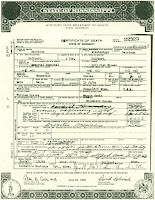Lee Moise Roosevelt Graves was a recording artist and guitarist who mixed secular and sacred material during his career. He is credited with making some of the earliest rock and roll recordings in 1936 in Hattiesburg. Born in Jones County near Laurel, Mississippi, he and his brother Uaroy began playing juke joints in the early 1920s, and in 1929 they cut a number of 'rocking and reeling' spirituals for Paramount, all of which feature pianist Will Ezell.
He is buried in Mississippi City Cemetery in Gulfport, Mississippi. The Mt. Zion Memorial Fund is now soliciting funds to erect a fitting headstone on his unmarked grave.
He is buried in Mississippi City Cemetery in Gulfport, Mississippi. The Mt. Zion Memorial Fund is now soliciting funds to erect a fitting headstone on his unmarked grave.
Please Donate Today!
Every Small (and large) Donation Counts!
The Graves brothers often performed on Front Street in Laurel, and the duo proved so popular that the audience at times blocked the road. Most of the time the brothers posted up in front of Lott’s Furniture Store, one of several similar stores in cities all across south Mississippi. The owner was Reuben Lott, a native of southwest Alabama who attended college at North Manchester, Indiana. He enjoyed the large crowds that gathered to hear the musicians, because larger numbers of people in front of the store often translated into large numbers of people who entered the store and bought furniture. The performances of the Graves brothers in front of Lott’s sometimes attracted the attention of the local police, who might either intervene and break up the crowd, or put some money in the tin cup and listen a while. By the end of the day, however, the brothers had usually filled the cup full of coins and dumped it out many times.
 In 1936 Paramount Records talent scout and Jackson furniture store owner H C Speir, who had been responsible for their 1929 recordings, located the Graves Brothers performing in a church in McComb, Mississippi, and arranged for them to do a second recording session in Hattiesburg at the Hattiesburg Hotel. To play piano in the session, Speir chose Cooney Vaughn, an influential live performer in Hattiesburg. They called the new combo the MISSISSIPPI JOOK BAND. The combination of Vaughn's uninhibited piano style with the religious feeling and musical versatility of the Graves Brothers resulted in what was described as the beginnings of a new type of music, rock and roll. With Roosevelt Graves singing vocals and playing guitar, brother Uaroy Graves on tambourine and kazoo, and Vaughn on piano they recorded a number of songs, amongst which were the notable, "Barbecue Bust" and "Dangerous Woman" both featuring fully formed rock and roll guitar riffs and a stomping rock and roll beat. The Mississippi Jook Band continued to perform for while during the late 1930's but then broke up. Piano player Cooney Vaughn performed weekly on radio station WCOC in Meridian prior to World War II.
In 1936 Paramount Records talent scout and Jackson furniture store owner H C Speir, who had been responsible for their 1929 recordings, located the Graves Brothers performing in a church in McComb, Mississippi, and arranged for them to do a second recording session in Hattiesburg at the Hattiesburg Hotel. To play piano in the session, Speir chose Cooney Vaughn, an influential live performer in Hattiesburg. They called the new combo the MISSISSIPPI JOOK BAND. The combination of Vaughn's uninhibited piano style with the religious feeling and musical versatility of the Graves Brothers resulted in what was described as the beginnings of a new type of music, rock and roll. With Roosevelt Graves singing vocals and playing guitar, brother Uaroy Graves on tambourine and kazoo, and Vaughn on piano they recorded a number of songs, amongst which were the notable, "Barbecue Bust" and "Dangerous Woman" both featuring fully formed rock and roll guitar riffs and a stomping rock and roll beat. The Mississippi Jook Band continued to perform for while during the late 1930's but then broke up. Piano player Cooney Vaughn performed weekly on radio station WCOC in Meridian prior to World War II. |
| Artist rendering of the Graves' brothers on Front Street |
Sometime in the 1940s, he moved back to Laurel with Mary. She died in the early 1950s, and Uaroy died in the late 1950s. Roosevelt, meanwhile, wound up in Hattiesburg, where he hooked up with a blind woman named Elizabeth Woods. She took him home to Gulfport, where they supposedly got married. In his last years, he joined the Baptist Church and sang in a male quartet. Someone even saw him perform in Chicago around 1962 at Maxwell Street Market. He was in Gulfport, however, on December 15, when he suffered a heart attack. He died fifteen days later, and he was buried on January 6, 1963 in an unmarked grave in Mississippi City Cemetery. Beside him, most likely, lie the remains of Elizabeth Woods, who died in 1970.






